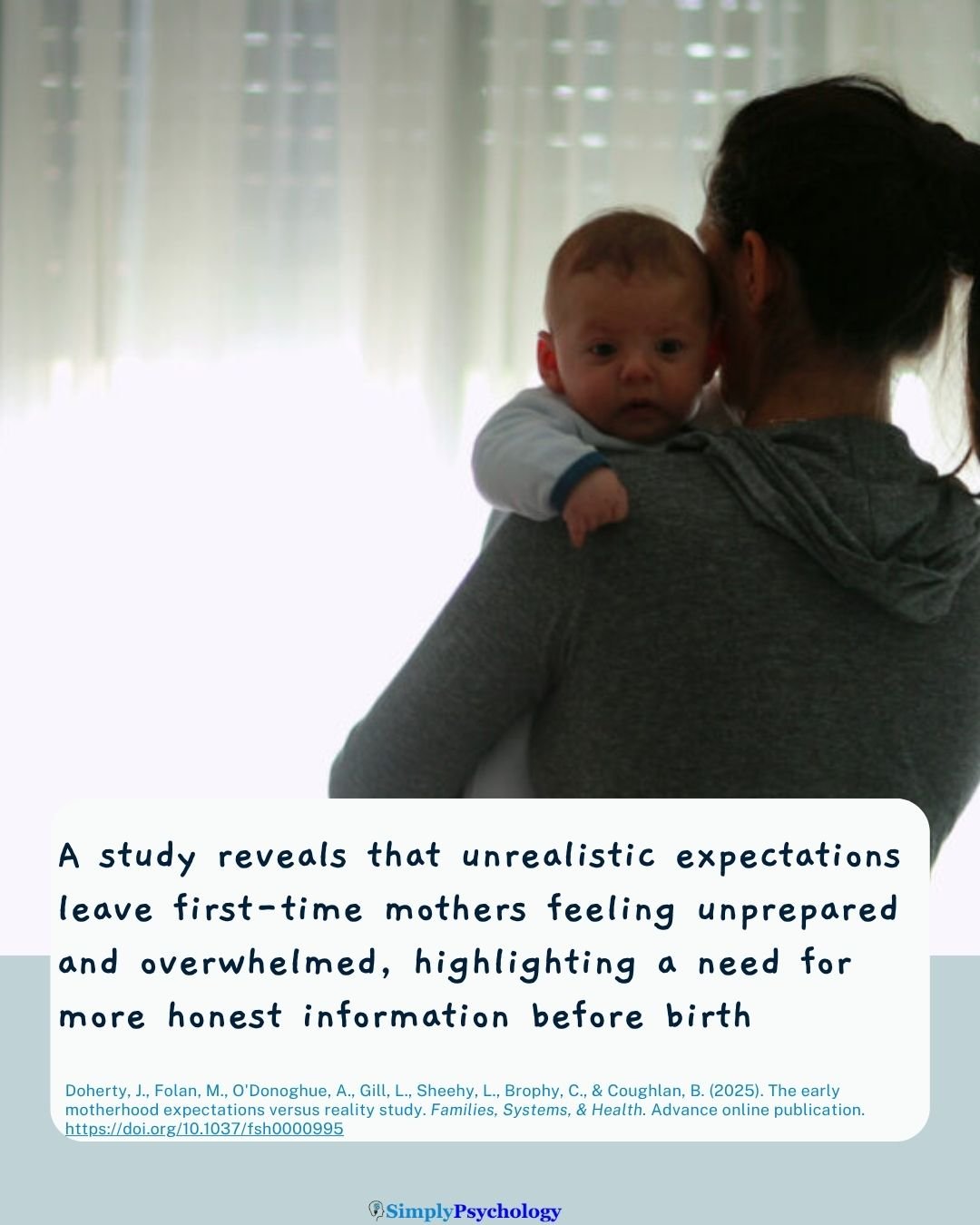Motherhood on social media is often portrayed as effortless, joyful, and aesthetically perfect. These idealized images can create unrealistic expectations, leading mothers to feel inadequate or guilty when their own experiences don’t match.
Studying this area is crucial to understand how digital portrayals influence maternal mental health and to inform more realistic antenatal education and supportive practices for new mothers.

Doherty, J., Folan, M., O'Donoghue, A., Gill, L., Sheehy, L., Brophy, C., & Coughlan, B. (2025). The early motherhood expectations versus reality study. Families, Systems, & Health. https://doi.org/10.1037/fsh0000995
Key Points
- Phenomenon Studied: The transition to early motherhood, focusing on the discrepancy between expectations and the lived reality for first-time mothers.
- Research Aims: To explore how first-time mothers’ experiences of early motherhood align or differ from their prior expectations and to identify areas where support could be improved.
- Qualitative Approach: Reflexive Thematic Analysis (RTA) of data collected from three focus groups.
- Main Findings:
- First-time mothers faced emotional and physical challenges that differed starkly from expectations.
- Social portrayals of “perfect” motherhood heightened feelings of guilt, failure, and identity loss.
- Support from healthcare professionals, partners, and family was inconsistent—referred to as a “lottery.”
- Implications:
- Calls for realistic antenatal education, extended postpartum care, and social support systems.
- Highlights the need to normalize the full range of postpartum experiences and develop policies that integrate mental, emotional, and social health support.
Rationale
The study investigates the psychological and social experience of early motherhood—particularly the concept of expectations versus reality.
This includes themes such as maternal identity, support systems, and emotional well-being in the fourth trimester (the first 12 weeks postpartum).
Current Research Context
Motherhood is often idealized in Western societies, influenced heavily by social media, cultural myths, and limited antenatal education.
Prior research has identified high rates of maternal stress, anxiety, and depression postpartum, with Irish data showing up to 18% of new mothers reporting severe stress symptoms.
The psychological transition is compounded by poor preparation for emotional and social realities, unrealistic body image expectations, and variable postpartum support.
Research Gap
Few studies have explored the expectations versus reality of motherhood in an Irish context.
There is a lack of qualitative insight into how first-time mothers adapt to their new roles and identities amid societal and systemic pressures.
Importance
Understanding these mismatches can guide the development of maternal care policies, improve antenatal and postnatal services, and ultimately enhance psychological outcomes for mothers and families.
Addressing these gaps is crucial for a comprehensive view of maternal mental health and health service reform.
Method
- Sample: 16 first-time mothers, aged 26–40 (mean age 34), 2–7 months postpartum.
- All participants identified as female, heterosexual, working/middle class, and lived with the baby’s father.
- Ethnicity: 13 White Irish, 2 White European.
- Setting: Three maternity hospitals in Ireland (urban and rural). Participants were recruited via social media, GP posters, public health nurses, and supermarkets.
- Data Collection:
- Three semi-structured focus groups (6, 4, and 6 participants).
- Facilitated by a research assistant and a midwife at each site.
- Included written and verbal responses to questions like: “What advice would you give a friend who’s about to have a baby?”
- Data Type: Transcribed audio recordings.
- Analysis:
- Reflexive Thematic Analysis (RTA) using both inductive and deductive coding.
- Themes were shaped both by specific questions and emergent issues from discussions.
- Analysis performed by the research assistant; expert panel contributed to theme development and question refinement.
- Software: Not explicitly mentioned, suggesting manual coding and analysis.
Results
Theme 1: Expectations Versus Reality
- “I Wish I Knew…”: Mothers were unprepared for the intensity and constancy of early motherhood. They advised others to talk openly and ask for help. “I wasn’t expecting it to be as hard as it was to even get a shower.” – Audrey
- Instagram vs Reality: Social media shaped unrealistic expectations. “It’s that perfect, Instagram-worthy picture… in reality, it’s loads of un-showered days…” – Julianna
- My Own Worst Enemy: Self-criticism and emotional burden were common. “I don’t know how I am, and they don’t care how I am, but how is my little baby?”
- Motherhood Prep and Instinct: Antenatal education focused on childbirth, not postpartum life. Mothers relied on instinct and peer advice.
Theme 2: The Myths of Motherhood
- The Myth of “Normal”: Physical recovery, body image, and breastfeeding were more difficult than anticipated. “I thought I’d be back to my pre-pregnancy weight, but I’m still two stone heavier.” – Amy
- The Myth of Bonding: Some struggled to bond immediately with their babies. “I definitely didn’t feel that explosion of love. It’s definitely a process.” – Kate
- The Myth of Me: Mothers reported identity loss and emotional distress. “I feel I kind of lost who I was. I became a completely different person.” – Camilla
Theme 3: The Lottery of Support
- Professional Lottery: Quality of care from GPs and PHNs was inconsistent. “He’s like, ‘I’m not gyno trained.’” – Carmel
- Partner Lottery: Mothers carried the mental load; partner support varied. “If you don’t do it, it doesn’t get done.” – Emily
- Friends and Family Lottery: Support from relatives was mixed—sometimes helpful, sometimes intrusive. “To a point that it’s too much… kind of quite past remarkable.” – Ruth
Theme 4: Surviving and Thriving
- Me Time, Please: Sleep deprivation and emotional exhaustion were common. “If I don’t have sleep, I can’t do anything. I just sit there crying.” – Petunia
- Improve Care in the Fourth Trimester: Mothers wanted more holistic postpartum check-ins (e.g., at 12 weeks, not just 6). “There should definitely be extended aftercare…” – Carmel
- Finding My Network: Peer support groups were vital for emotional validation and friendship. “They’re the best group of girls I’ve ever met.” – Amy
- This Too Shall Pass: As time went on, most mothers adapted and experienced improved mood, routines, and bonding. “Things change continually, and the bad moments pass.” – FG3
Insight
This study offers several novel contributions:
- Reframes the fourth trimester as a time of profound emotional labor, not just physical recovery.
- Exposes the internalization of social myths—even among women who consciously reject them.
- Reveals the critical role of inconsistent support across professional, familial, and social networks.
- Validates the concept of maternal identity loss, linking it to control, guilt, and self-efficacy.
It advances the field by:
- Highlighting the need for reform in postnatal care policy, especially in underrepresented contexts like Ireland.
- Supporting calls for realistic antenatal education and culturally sensitive maternal care.
- Suggesting future studies track changes in identity, self-efficacy, and support systems longitudinally.
Clinical Implications
- Policy Change: Extend and restructure postnatal check-ups to include comprehensive assessments of maternal mental and physical health beyond the 6-week mark.
- Service Design: Integrate community support programs and facilitate access to evidence-based peer groups.
- Education: Provide antenatal resources that include emotional, psychological, and social adjustments—not just physical and birth-related topics.
- Training: Equip GPs and PHNs to offer empathetic, proactive postpartum care that acknowledges the needs of the mother as well as the baby.
- Cultural Shift: Promote public awareness campaigns to challenge “perfect mother” myths and normalize emotional variability in early motherhood.
Strengths
- Rich Qualitative Depth: Reflexive thematic analysis captured nuanced, lived experiences.
- Participant Openness: High levels of self-disclosure provided emotional depth and authenticity.
- Multi-Site Sample: Inclusion of rural and urban sites improved contextual diversity.
- Expert Panel Involvement: Guided data collection and analysis, increasing methodological rigor.
Limitations
- Sample Homogeneity: All participants were white, heterosexual, cohabiting women—limiting generalizability to marginalized or diverse populations.
- Small Sample Size: Only 16 participants, with low focus group attendance due to early motherhood demands.
- Short-Term Design: No longitudinal follow-up to explore adaptation over time.
- Professional Care Evaluation: Based on self-report, without triangulation from provider perspectives.
Socratic Questions
- Methodological Reflection: What are the benefits and limitations of using focus groups for exploring personal experiences like early motherhood?
- Alternative Perspectives: How might the findings differ if this study included mothers from marginalized or non-Western communities?
- Critical Assumptions: To what extent do societal myths about motherhood influence not just expectations, but health outcomes?
- Clinical Application: How can healthcare providers proactively challenge unrealistic expectations during antenatal care?
- Policy Inquiry: What systemic changes would be necessary to implement extended postpartum care at a national level?
- Ethical Consideration: Is it ethical for antenatal education programs to underemphasize the emotional challenges of early motherhood in the name of reassurance?
- Personal Insight: If you were to design a support program for new mothers, what elements would you include to address the emotional, practical, and social needs highlighted in this study?

Related Research
Munns, L. B., Noonan, M., Romano, D. L., & Preston, C. E. J. (2025). Interoceptive and exteroceptive pregnant bodily experiences and postnatal well-being: A network analysis. British Journal of Health Psychology, 30, e70002.

